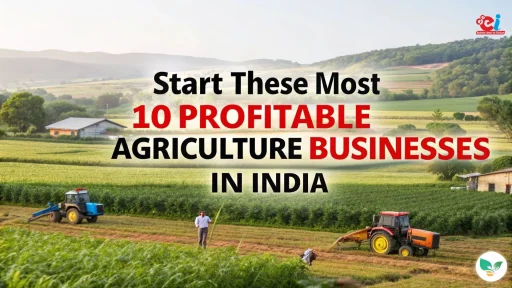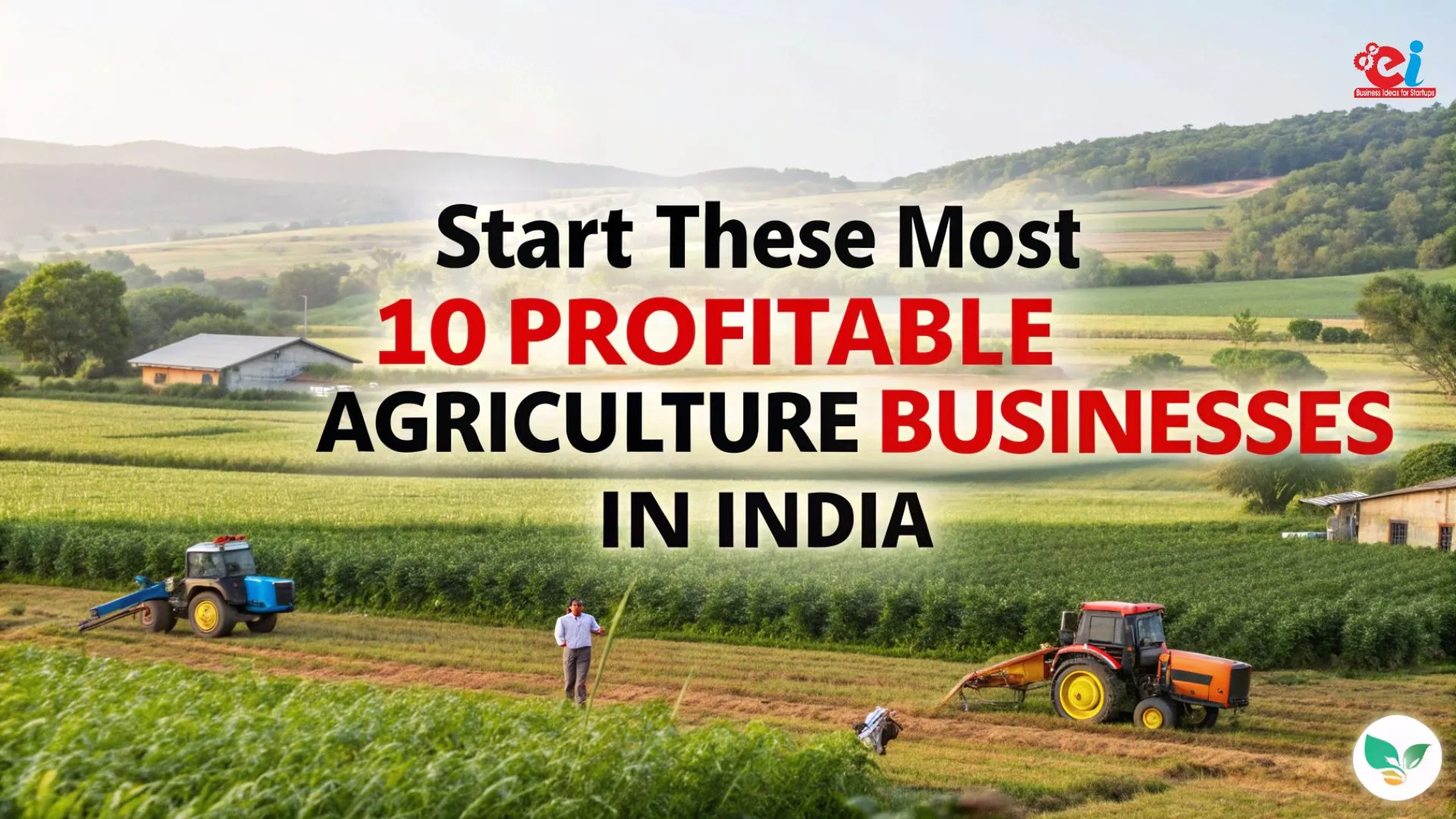A Strategic Opportunity for Pharma-Focused Entrepreneurs in API and Intermediate Manufacturing
Most 10 Profitable agriculture business practices in India are evolving silently with the integration of new age pharmaceuticals, nutraceuticals, and biotechnology. Pharma-focused entrepreneurs stand to gain a lot from the agri-industrial market, especially those interested in API and Intermediate Manufacturing, as it is still in its initial stages.
Seasonal farming is now transforming into a painstakingly scientific, process-intensive endeavor. India’s rich biodiversity and varied climate make it a leader in agro-based production for pharma supply chains, driving strong demand for raw herbal materials.
In this article, I am going to talk about ten very profitable agriculture businesses in India that have pharmaceutical applications. These opportunities suit entrepreneurs with expertise in manufacturing, formulation, or supply chain logistics. They enable scalable units backed by scientific research, market demand, and government policy.
The Agriculture-Pharma Crossover: A Strategic Change
To many entrepreneurs, especially those in API (Active Pharmaceutical Ingredients) manufacturing, venturing into agriculture would seem absurd. However, the accessibility of key APIs like curcumin, ashwagandha extract, neem oil, and gingerol makes the overlap apparent. The pharmaceutical industry’s move toward clean label, botanical, or naturally derived ingredients is now a sector requirement because of policy shifts and market expectations.
In India, this change is backed by strong policy frameworks. The Ministry of AYUSH, National Medicinal Plants Board (NMPB), APEDA, and the respective state agriculture departments are actively supporting the agriculture-based sourcing of raw materials of herbal drugs. For pharma-aligned entrepreneurs who wish to establish integrated agri-manufacturing units, the synthesis of policies provides a ready-to-use platform.
Related: India’s Agriculture Sector: Its Role in Government Initiatives
Market Outlook: Pharma and Nutraceuticals Agro Based Inputs
The Indian herbal actives, nutraceuticals, and plant‑derived APIs market is expected to grow at a 12% CAGR from 2025 to 2030. Exports of herbal APIs are also increasing, especially to big markets like Europe, the US, Japan, and South Korea.
Medicinal plants, essential oils, phyto-extracts, oleoresins, and organic oils are used widely in OTCs, diet supplements, and even regulated pharmaceuticals. We have seen several Indian pharmaceutical companies launching product lines based fully on botanicals proving that this cross-over is strategically important.
1. Medicinal Plants Cultivation and Processing: Shatavari, Giloy, and Ashwagandha
Ashwagandha, Giloy, and Shatavari are medicinal plants that are gaining a lot of traction in both domestic and international markets. They are used in immunity boosting supplements, hormonal balance capsules, anti-inflammatory formulations, and even adaptogenic APIs.
In India, the cultivation of medicinal plants now employs tissue culture techniques and certified organic methods, along with traceability systems. New entrepreneurs in this area can develop a backward integration model by farming these plants and setting up processing units that convert raw herbs to dried, powdered, or extract forms. These processed herbs are used as inputs by pharmaceutical companies, contract manufacturers, and nutraceutical brands.
Pharma-grade raw material undergoes processes such as drying, grinding, and standardization, which preserve active content consistency. Ashwagandha roots are processed to KSM-66 and other high-concentration extracts that are awarded significant premiums globally.
2. Aloe Vera Gel and Extract Manufacturing
Aloe Vera is more than a cosmetic component; it plays an important role in therapeutic gels, burn treatments, anti-inflammatory creams, and dermatological active pharmaceutical ingredients (APIs). Biologically active components within the gel help Aloe Vera heal and regenerate, with over 200 healing and regenerative components.
For entrepreneurs, Aloe Vera cultivation and establishing an integrated unit for gel extraction and stabilization offers great profit potential. The process involves harvesting mature leaves, cold extracting the gel, then filtering, pasteurizing, and stabilizing it with food‑grade preservatives. The stabilized gel can then be packed in bulk containers or processed into concentrates for use in pharmaceuticals and cosmeceuticals.
Aloe Vera cultivation is practiced in India because of the good climate condition prevalent in the country throughout the year. Additionally, the plant is drought resistant and care free, making it easier to maintain at a larger scale.
3. Lemongrass, Eucalyptus, and Peppermint Essential Oil and Oleoresin Extractions
Analgesics, cough syrups, antibacterial agents, and aromatherapy products rely heavily on plant‑derived essential oils and oleoresins. Additionally, they make use of volatile and non‑volatile compounds extracted from plants.
Pharmaceutical, cosmetic, and wellness industries are in need of natural ingredients to replace their synthetic ingredients. Hence, the construction of a steam distillation unit for essential oils or a solvent-extraction plant for oleoresins serves dual purposes because these can also be sold to such companies.
Therapeutic uses of plant oils bear key compounds such as citral and menthol. Some examples include lemongrass and peppermint oil. Furthermore, some other oils and extracts like clove oil and cinnamon extracts contain known antiseptic properties.
Growing the raw materials is easy and distillation technologies are inexpensive and easy to scale. Indian exporters are meeting large orders in the EU market and there is a high demand for essential oils that comply with stringent REACH and GMP standards.
4. Manufacturing Neem-Based Biopesticides and Active Pharmaceutical Ingredients (APIs)
Neem is well-known to have anti-fungal, anti-bacterial, and insecticidal properties. Currently, the active ingredient Azadirachtin found in neem is being extracted and processed for agricultural purposes and for use in pharmaceutical products like skin care formulations, including those for wound healing and immune boosting medications.
An entrepreneur can set up a neem oil extraction unit and Azadirachtin purification plant with broader industrial bio-inputs prospects. There is also a market for residual neem cake as a fertilizer.
Extraction involves either cold pressing or solvent extraction followed by purification which can utilize chromatography or molecular distillation. There is an increasing adoption of neem-based ingredients in herbal formulation as antivirals or anti-inflammatory agents.
India is amongst the largest producers of neem seed which gives local entrepreneurs a cost and raw material availability competitive advantage.
Related: Best Manufacturing Business Ideas in the Active Pharmaceutical Ingredient (API) Products Industry
5. Herbal API Extraction: Curcumin, Boswellia, and Bacopa
There is a great opportunity to capture value by establishing an herbal API extraction unit focusing on high demand actives such as Curcumin from turmeric, Boswellic Acid from frankincense, and Bacoside A from Brahmi.
These APIs find use in formulation for arthritis, neuroprotection, metabolic functions, and inflammation control. The extraction process uses either ethanol or supercritical CO₂ as solvents followed by drying, crystallization, and purity assays.
What is particularly interesting for pharma entrepreneurs is the regulation around consistency in potency and particle size. For those coming from the pharmaceutical or chemical sectors, this field is a more natural fit due to the application of HPLC, GC-MS, and other quality control methods.
The export of herbal APIs is projected to continue leading the growth in exports as the international demand for nutraceuticals is expected to reach $300 billion by 2030.
6. Spice Oleoresins from Turmeric, Ginger, and Clove
Natural medicine includes turmeric oleoresin, gingerol, and clove eugenol, which are also bioactives sourced from spices. These compounds are known to possess considerable anti-inflammatory, antioxidant, and analgesic activity.
Spice oleoresins are produced through solvent extraction, vacuum distillation, and must be standardized using spectroscopic methods. These compounds can be marketed as concentrated pastes or dried powders to pharmaceutical companies who incorporate them into pain relief creams, capsules, and sprays used for wound care.
Because India is the largest producer of spices, Indian firms have a competitive advantage in cost and sourcing. The demand for spice active ingredients is supported by the growing global clean-label trend.
7. Stevia Cultivation and Extract Refinement
Stevia, which has been used to sweeten foods and beverages for many years, is now finding its way into products like diabetic syrups and other health beverages. It differs from sugar in that it has no calories and is 300 times sweeter.
Pharmaceutical entrepreneurs can create a business around stevia by starting a unit for the drying and extraction of stevia leaves, which would enable them to obtain the valuable compounds known as Reb-A and stevioside. The extraction process is done with water or ethanol, followed by several purification stages, then crystallization.
The pharma sector is experiencing even greater demand for the sweetener because it is now used in OTC products for weight loss and diabetes. A solution to the problem of obesity and weight management, stevia-based sweeteners are rapidly integrating into everyday consumer products.
8. Nootropic Formulations with Cold-Pressed Oils
Nootropics include dietary supplements like soft gels or capsules of omega-3 which contain cold-pressed flaxseed, sesame, and evening primrose oils, serving as carrier oils in skin therapies and beauty products.
Unlike refined oils, cold-pressed oils retain their essential fatty acids, antioxidants, and vitamins—making them suitable for therapeutic applications. The extraction process is mechanical, conducted below 40°C to avoid loss of nutrients.
These oils are both in high demand in the pharma industry as well as in the nutraceutical export market, presenting a profitable option for those looking to manufacture cold-pressed oils as they adhere to clean label standards and require simple processes.
9. Moringa Powder and Capsule Manufacturing
Startups like the Moringa Moringa offers it customers with multivitamins enables one to fully utilize energy boosters, bone health supplements and moringa oleifera. Ashoka Moringa Pvt gives moringa its recognition for the leaves embracing, iron, protein, calcium and antioxidants.
In India and overseas, there is a rise in the demand for health consuming products. Also, the market for moringa is expected to get steadier with time. For entrepreneurs, moringa is quite simple to grow. A set up for drying the leaves and pulverizing them can lead to extracting units, this makes selling easy. The powder or processed capsules and tablets can be used for B2B supplies.
Other than that, the growth in Agri-pharma units is quite negligible hence their return on investment can be fueled by proper marketing and advertisement later on.
10. Mushroom-Based Bioactive Extracts
Mushroom cultivation for bioactive reasons alongside the shiitake, Ganoderma and Cordycep mushrooms act as herbal antidepressants and immune boosters. They serve a large purpose in the natural medicine industry hence are vital for most countries nutraceutical markets.
Establishing a mushroom extraction and cultivation unit invovles substrate preparation, incubation along with drying, followed by hot water extraction. The extract is then filtered, concentrated and then uses spray drying to bind it in capsule or pill forms.
Pharmaceutical and biotech experienced enterprenuers in India enable mushroom cultivation, which is rather under utilized providing immense potential for growth to new start ups.
For more information watch our related videos for this article
Concluding Remarks
10 most profitable Agriculture businesses are shifting from simply feeding people to also focusing on healing them. For someone with a background in pharmaceuticals or manufacturing, venturing into agri-based industries brings about two benefits: economical raw materials and seamless integration into the ever-expanding international market for plant-derived actives.
Each of the mentioned businesses has lucrative opportunities while also strategically complementing India’s goal of becoming a global hub for herbal APIs, nutraceuticals, and wellness-based exports.
About NPCS
NIIR Project Consultancy Services (NPCS) specializes in preparing Market Survey cum Detailed Techno Economic Feasibility Reports for new and emerging industrial projects. Their comprehensive reports encompass the manufacturing processes, raw materials, plant layout, and financials. NPCS offers and guides agro-industrial entrepreneurs through the entire process, helping them evaluate setting up new ventures from planning, execution, and beyond.







